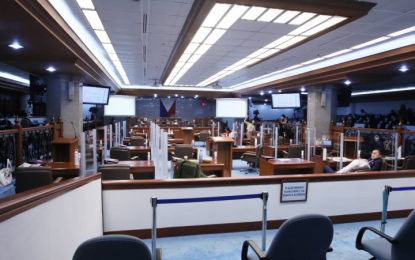
Senate session hall (PNA File Photo)
MANILA - The Senate on Monday approved on third and final reading the Malacanang-sponsored New Agrarian Emancipation bill that will condone all loans including interests, penalties and surcharges, arising from the award of agriculture lands under the Comprehensive Agrarian Reform Program as of Dec. 31, 2022.
Senate Bill 1850, which was included in Malacanang’s list of priority bills, gathered 23 votes without abstention.
Senator Cynthia Villar, who chairs the Senate Committee on Agriculture, Food, and Agrarian Reform, said the measure shall cover two types of loans given to Agrarian Reform Beneficiaries (ARBs)>
These include loans of ARBs who have Agrarian Reform Receivables (ARR) Account with the Land Bank of the Philippines (LBP) and those who have not paid or have incomplete payments of their amortization on the principal, interests, penalties and surcharges of their lands under Presidential Decree 27, and subsequent amendments to Republic Act No. 6657.
"This bill seeks to help alleviate the plight of our ARBs who are farmers for them to recover and overcome the fallout of the Covid-19 crisis, the devastating African swine fever, the ongoing Avian influenza, the increasing cost of fertilizer, fuel and other farm inputs and climate change," Villar said in her sponsorship speech.
"Condoning their amortization will provide them the much-needed financial resources that shall help them develop their farms, increase their productivity and advance an agriculture-driven economy, improve the lives and that of their families, reduce poverty, accelerate rural development and promote food security," she added.
She said that the measure involves 1,173,101.574 hectares of agricultural land with PHP57.557 billion in principal debt and will cover 610,054 ARBs.
The Senate, at the same time, passed also on third and final reading the Senate Bill 1604 or the Academic Recovery and Accessible Learning (ARAL) Program Act being pushed by Senator Sherwin Gatchalian.
The bill proposed to allow learners to catch up with the rest of the world despite learning losses through well-systematized tutorial sessions and well-designed remediation plans targeting learners who did not enroll in School Year 2020-2021 when the pandemic began.
Gatchalian, who chairs the Committee on Basic Education, was referring to students who were lagging academically, and are at or marginally above the minimum level of mastery required in Language, Mathematics, and Science.
He cited estimates from the National Economic and Development Authority (NEDA) that such learning loss may cause about PHP10.1 trillion in economic losses over the next 40 years if not addressed immediately.
The ARAL Program, the senator said, is a free and effective program aimed at closing the learning gap.
"The ARAL Program Act is an essential piece of education reform legislation designed to help our learners get back on track. Under the ARAL Program Act, learner recovery and economic recovery will be achieved together, leading us towards a brighter and more prosperous future," Gatchalian said.
The World Bank has estimated that learning poverty as of June 2022 in the Philippines was 90.9 percent.
Learning poverty is the percentage of children aged 10 who cannot read or comprehend a simple story. (PNA)
